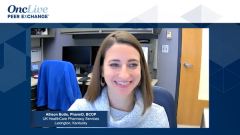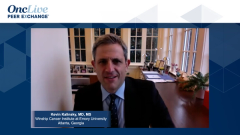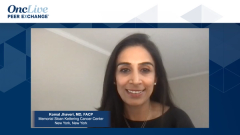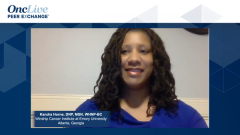
Adjuvant T-DM1 Therapy for HER2+ Breast Cancer
Impressions regarding the management of a 62-year-old woman with HER2-postive breast cancer who received adjuvant T-DM1 treatment following neoadjuvant TCHP and has signs of residual disease.
Episodes in this series

Kevin Kalinsky, MD, MS: We’re going to talk through 2 clinical scenarios. This is the first scenario: a 62-year-old woman who is active and enjoys spending time with her grandchildren, and she presents with a new right breast mass that was diagnosed on screening mammography. You can see there is no family history. She has 2 children, and she went through menopause at age 52. In terms of her past medical history, she has limited comorbidities. She has hypertension, which has been well controlled on lisinopril, and she takes a baby aspirin a day.
She undergoes mammogram, given these findings on imaging. They biopsy her right breast and x-ray her lymph node, which reveal as hormone receptor–negative, HER2 [human epidermal growth factor receptor 2]–positive, given that the (given that the IHC [ImmunoHistoChemistry test] is 3+) invasive ductal adenocarcinoma. There’s this perineural invasion as well. She undergoes staging scans—those are done to rule out metastatic disease—and those are negative. We know this is at least stage II disease, given that she has an axillary lymph node that’s involved. She undergoes 6 cycles of neoadjuvant TCHP [docetaxel, carboplatin, trastuzumab, pertuzumab], and she has clinical response to the therapy.
She undergoes a right mastectomy and has an axillary lymph node dissection, presuming that was what was discussed with the patient given that she had a clinically node-positive breast cancer at the time of diagnosis. She has a good response but still has 6 mm of residual disease. Next she receives adjuvant TDM-1 [trastuzumab emtansine]. I’ll start with Komal. Would you approach this patient similarly? In your clinic, is there any threshold for residual disease at which you don’t consider giving TDM-1 [trastuzumab emtansine] and continuing trastuzumab-based therapy?
Komal Jhaveri, MD, FACP: That’s a fantastic question. Based on the data presented on the KATHERINE trial, there doesn’t seem to be a threshold for not offering this to our patients. My practice has been to offer TDM-1 [trastuzumab emtansine] for patients with residual disease. I’m not holding that back, given the dramatic difference in the invasive disease survival that we saw: 11%, 88% of the TDM-1 [trastuzumab emtansine] arm compared with the trastuzumab arm. In that trial, there was no continuation of HP [trastuzumab, pertuzumab] necessarily, so we don’t know what the differences would be. But from that trial, my practice has been regardless of the residual disease, as long as there’s some seen in the surgical specimen.
Kevin Kalinsky, MD, MS: I’m going to ask you a somewhat off-topic and challenging question. For those patients who have a pCR [pathologic complete response], to whom you’ve given Herceptin and Perjeta, do you continue the Perjeta in the adjuvant setting as well?
Komal Jhaveri, MD, FACP: Yes, I always continue the Perjeta unless the patient is struggling with some toxicity or there’s unexpected diarrhea creeping up because of the pertuzumab that some patients have. I have not been holding back on the HP [trastuzumab, pertuzumab] maintenance, despite pCR. Until we have those data, and there are many trials trying to address that, my practice has been to offer that and continue that 1 year of therapy and complete that.
Kevin Kalinsky, MD, MS: In terms of studies in the residual disease setting, there are the studies you mentioned of TDM-1 [trastuzumab emtansine] vs trastuzumab deruxtecan. There’s also the NCI [National Cancer Institute]–sponsored study looking at TDM-1 [trastuzumab emtansine] plus or minus tucatinib to see whether there’s additional benefit.
Komal Jhaveri, MD, FACP: That’s such a great effort. CompassHER2 would be very exciting to look at, to see what we can do for residual disease and where can we can’t do more. That’s an exciting study that’s ongoing.
Transcript edited for clarity.




































